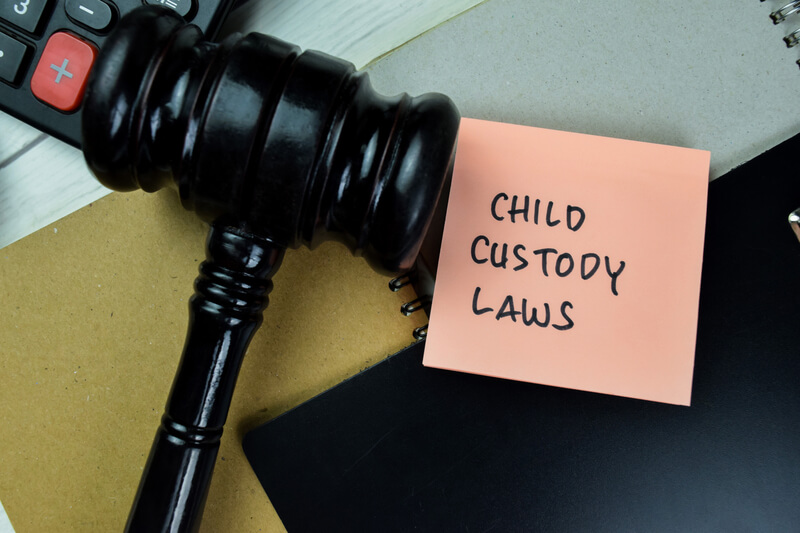How do you prepare for a child custody hearing? While getting a divorce is challenging, fighting over child custody can intensify the emotional turmoil. The best interests of your children come first as a parent, but you desire to make the most of the time you have with them. Being prepared to face a contested custody case is essential. Understanding your options, whether joint custody or other arrangements, can help manage the situation. It’s essential to know the procedures, claims, and potential expenses involved and the possible distance between parties. Consulting with experts can give you an idea of what to expect in your case and provide a clear statement of your position. Everyone involved should be aware of the claims and services available to them, ensuring that both sides are informed about the best course of action.
How to Prepare for a Child Custody Hearing: A Step-by-Step Guide
A child custody hearing can be an emotionally fraught and stressful experience, as the court will make decisions that affect the future of both parents and, most importantly, the child involved. Nevertheless, with adequate preparation, you can approach the hearing with assurance and guarantee that you will present your case effectively. The following is a comprehensive guide to preparing for a child custody hearing:
Understanding the Legal Process
It is crucial to comprehend the legal process underpinning child custody hearings before collecting evidence or presenting your case. Become acquainted with the laws governing child custody in your state, as each state has its own set of regulations. The court will typically prioritize the child’s best interests, considering factors such as:
- The child’s age and health
- The emotional bonds between the child and each parent
- Each parent’s capacity to rear the child
- The child’s preference (provided that they are of sufficient age)
- Any history of neglect or abuse.
To gain a more comprehensive comprehension of how these factors relate to your case, it is recommended that you consult with an experienced family law attorney.
Engage in a Consultation with an Accomplished Family Law Attorney
When preparing for a child custody hearing, a family law attorney is an invaluable resource. They can assist you in comprehending your rights, advising you on the most effective strategies for presenting your case in court and guiding you through the legal aspects of your case. Additionally, they can aid in collecting the requisite documentation and evidence.
Arrange Your Documentation
It is essential to be well-organized when preparing for a child custody hearing. You must submit evidence demonstrating your capacity to establish a secure, nurturing, and stable environment for your child. Documents that may be required include:
- Parenting Plan: If you have already discussed a parenting plan with the other parent, please ensure that you bring a copy. Should you still need to address this matter, your attorney can assist you in formulating one.
- Communication Records: Please record any correspondence between you and the other parent regarding your child, such as text messages, emails, or letters. This may be significant evidence if the other parent has been uncooperative or hostile.
- Medical and Educational Records: Please provide copies of your child’s medical history, school records, and any documents that pertain to their extracurricular activities. These recordings demonstrate your involvement in their daily lives and overall health.
- Witness Statements: If you have family members, acquaintances, or other individuals who can attest to your parenting abilities, request that they either provide written statements or be willing to testify in court.
Be Prepared to Discuss Your Relationship with Your Child
The judge will be interested in learning about your relationship with your child and how you contribute to their daily life during the court proceedings. Be prepared to explain:
- Your participation in your child’s education, healthcare, and emotional requirements.
- How have you resolved previous disputes with the other parent, and what is your availability to co-parent?
- If applicable, any prior instances of neglect or abuse.
- Demonstrate your dedication to being a responsible, active parent and prioritize the child’s well-being.
Maintain a Professional and Calm Atmosphere
However, it is imperative to maintain a professional and composed demeanor throughout the hearing, as the courtroom can be an emotional environment. Avoid disputes with the other parent, even if they say something frustrates you. A calm, respectful demeanor will positively impact your case, as the judge will observe both parents’ behavior and interactions.
- Dress appropriately: Demonstrate reverence for the court by dressing appropriately. Present yourself as a responsible and serious individual by wearing business attire.
- Maintain Concentration: Refrain from providing excessively personal or irrelevant information and adhere to the facts. Your attorney will assist you in maintaining your focus throughout the hearing.
Mediation Consideration
The court frequently requires or encourages mediation before a hearing. Mediation can effectively resolve child custody disputes outside the courtroom if both parents are amenable to collaboration. Mediation may assist you and the other parent in reaching a mutually beneficial agreement on custody arrangements, thereby minimizing the need for a protracted court battle.
Prepare for the Other Parent’s Case
Be prepared for the opposing parent to provide their perspective on the matter. They likely have evidence and testimony substantiating their capacity to care for the infant. It is imperative to anticipate their arguments and formulate counterarguments to prepare for this. Collaborate closely with your attorney to prevent any surprises.
Be Prepared to Adhere to the Judge’s Ruling
Custody arrangements will be determined by the judge following the hearing’s conclusion. The judge may issue a ruling promptly in certain instances, but it is more common for them to do so after some time. Be prepared to comply with the judge’s directives, as disregarding them may result in legal repercussions and affect future custody proceedings.
Follow-up Following the Hearing
Adhere to any actions the judge mandates following the hearing, such as attending parenting courses or a new custody arrangement. Maintaining communication with your counsel is imperative to guarantee compliance with the court’s ruling.

Understanding Courtroom Protocol
Courtroom protocol is a system of rules and guidelines that regulate the behavior and interaction of individuals in a courtroom. It is essential to comprehend courtroom protocol to ensure that proceedings proceed efficiently and that you present yourself in the most favorable light, regardless of whether you are a plaintiff, defendant, witness, or legal representative. The following is a comprehensive guide to assist you in comprehending the primary components of courtroom protocol:
Be Punctual
Punctuality is indispensable in any legal context. Arriving early guarantees sufficient time to locate the courtroom, navigate security, and establish communication with the court clerk or bailiff. It also allows you to prepare mentally for the hearing or trial. However, court proceedings may be delayed, and your tardiness may negatively impact your professionalism.
Dress Appropriately
Considering your appearance in the courtroom is crucial, as it can significantly impact how others perceive you. It is advised to be dressed in formal or business attire. Women may opt for a professional dress or blouse with trousers or a skirt, while men are inclined to wear a suit or dress shirt with slacks. It is advisable to refrain from wearing casual attire, such as denim, t-shirts, or sneakers, as it may convey a lack of respect for the court and the legal process.
Demonstrate Respect for the Judge and Court Personnel.
The judge is the authority figure in the courtroom, and you must consistently demonstrate respect. Always address the judge with “Your Honor.” When the judge enters or exits the courtroom, remain seated and refrain from interrupting them while they are speaking. This pertains to all judicial personnel contributing to the court’s order, such as bailiffs, clerks, and stenographers. Display respect by promptly adhering to their instructions without question.
Etiquette and Conduct
Courtrooms are formal environments; all participants are expected to exhibit appropriate conduct. It is essential to adhere to the following guidelines:
- Refrain from speaking out of turn: Maintain silence. If you desire to address the court, you must first obtain the judge’s approval.
- Maintain Your Composure: Although court cases can be emotionally charged, it is crucial to maintain a composed demeanor at all times. Be mindful of your emotions, refrain from expressing frustration, wrath, or excitement, and refrain from raising your voice.
- No Disruptions: In the absence of disruptions, avoid conversing with other individuals in the courtroom. Talking during the ongoing proceedings may be regarded as disrespectful and disruptive.
- Cell phones are prohibited in most courtrooms: Ensure your phone is turned off and placed in your pocket or backpack. In certain courts, you may need to surrender your phone to security personnel prior to entering.
Addressing the Court
Always respectfully address the judge and the courtroom when it is your moment to speak in court. The following are fundamental guidelines for communicating with the court:
- Be Direct and Concise: Be direct and to the point when communicating. Refrain from meandering, as this can result in confusion and wasted time.
- Utilize formal titles: Address individuals in the tribunal by their formal titles, such as “Mr. [Last Name]” or “Ms. [Last Name].”
- Prevent Emotional Outbursts: Maintaining a professional demeanor when communicating is crucial. Attempt to maintain a collected demeanor, regardless of whether the subject matter is personal or emotive.
The Function of the Attorney
If an attorney represents you, they will be the ones to present your case to the court. Your responsibility as the client is to attend to their advice, furnish them with the requisite information, and assist them in effectively presenting your case. Your attorney will typically direct you when it is your turn to testify or ask you questions if you are required to speak during the trial or hearing.
Courtroom Testimony
If you are summoned to testify as a witness, you must sign an oath of truthfulness. The following are a few suggestions for providing testimony in court:
- Please listen to the inquiry: Before responding, pay careful attention. If you are unable to comprehend it, please request clarification.
- Respond solely to the inquiry: Offer succinct and unambiguous responses. Refrain from providing irrelevant information or opinions.
- Speak with clarity: Speak at a volume that is audible to all individuals in the tribunal. Maintain the clarity and conciseness of your responses.
- Maintain composure: Although testifying can be distressing, it is crucial to maintain one’s composure. If you are uncertain about the answer to a query, it is acceptable to respond with “I am unsure” rather than making an educated guess.
Compliance with Court Orders
It is imperative to adhere to all court orders, regardless of whether they pertain to evidence, conduct, or subsequent actions. Noncompliance may lead to legal repercussions, such as contempt of court charges or penalties.
The Function of the Jury
The jury is responsible for determining the facts of the case by evaluating the evidence presented in jury trials. All participants in the courtroom must respect the jury’s role and refrain from attempting to influence or communicate with them outside the established procedures while the jury is present.
- Absence of Direct Communication: Not endeavor to communicate with or influence jurors. Jurors are prohibited from communicating with one another during the trial.
- Ensure Objectivity: The jury must maintain its impartiality throughout the trial. Jurors should refrain from formulating opinions before the presentation of all evidence.
Procedures in the Courtroom During Trials
There are specific critical instances in the course of a trial that you should be aware of:
- Opening Statements: At the commencement of the trial, each party will present a concise summary of their case to the court.
- Evidence Presentation: Both parties can present evidence, summon witnesses, and make arguments.
- Closing Arguments: Following the presentation of all evidence, both parties will summarize their case and elucidate why the judge or jury should rule in their favor.
- Verdict: Following the conclusion of the closing arguments, the judge or jury will deliberate and render a decision. In non-jury cases, the judge will render the final decision.
Conclusion
Preparing for a child custody hearing can be overwhelming. However, with the appropriate strategy, including consulting with a lawyer, assembling pertinent documentation such as an affidavit, and focusing on your child’s best interests, you can present a compelling argument demonstrating your role as a responsible and compassionate guardian. It is crucial to maintain composure during the hearing, understand the issues at hand, and be prepared for negotiation. Your appearance and adherence to courtroom etiquette will significantly impact your chances in family court. By concentrating on visitation rights and focusing on the child’s well-being, you will be in the most advantageous position to ensure the court’s decision aligns with their welfare.
Frequently Asked Questions
Is it essential to retain counsel for a child custody hearing?
Although it is not always necessary to retain an attorney, it can substantially enhance your likelihood of success. An attorney can assist you in comprehending the legal process, offering strategic guidance, and guaranteeing that your rights are safeguarded during the hearing.
How can I demonstrate to the court that I am amenable to co-parenting?
Present evidence of your efforts to collaborate, such as past communication or collaborative decisions regarding the child’s education or health, to demonstrate a willingness to collaborate with the other parent. Demonstrating a cooperative attitude and flexibility can positively influence the court’s decision.
Does a child's opinion influence the custody decision?
The judge may consider the child’s opinion in numerous instances, provided they are of sufficient age (typically 12 years or older). Nevertheless, the child’s preference is merely one of the numerous factors the judge evaluates when determining the child’s best interests.
What are parents' most prevalent errors when preparing for a child custody hearing?
Refraining from being prepared regarding evidence, aggressive or excessive emotional behavior in court, and failure to adhere to the judge’s directives are among the most prevalent errors. Maintaining a sense of order, composure, and respect is crucial.
What transpires after the hearing?
The judge will issue a judgment following the hearing, which may be immediate or require some time. Be prepared to comply with any orders concerning custody arrangements and to maintain communication with your attorney for guidance on the next steps.
Is there a specific way I should respond when the adjudicator poses challenging questions?
Respond with honesty and composure, adhering to the facts. It is permissible to acknowledge that you are unaware of the answer to a query. Refrain from expressing anger or defensiveness. Your attorney can assist you in anticipating potential inquiries.
How can I demonstrate that my infant experiences a stable living environment?
To demonstrate stability, provide evidence of a safe and comfortable living environment, such as photographs of your residence, proof of steady employment, and a consistent routine for your child. Prove that you have a support system, such as extended family or acquaintances, that can help with the child’s care, if feasible.
Should I address the judge directly during the hearing?
It would help if you generally addressed the judge when asked questions or when your attorney allows you to communicate. Always maintain a respectful demeanor and respond to inquiries directly. Refrain from interrupting the judge or the other parent.
Can the judge alter the custody arrangement following the hearing?
Yes, the judge has the authority to alter the custody arrangement in the future in the event of substantial changes in circumstances, such as one parent’s relocation or the child’s evolving requirements. If you or the other parent request a modification, you may need to return to court.
What should I do if the other parent fails to adhere to the custody agreement?
If the other parent is violating the custody agreement, it is important to document each incident and attempt to resolve the matter through mediation or communication. If the issue persists, you may need to return to court to enforce the agreement or request a modification.

Contact an Experienced Child Custody Attorney Today!
You’re one of many who need help preparing for an approaching child custody hearing! Numerous individuals have benefited from the help of Huggins Law Office attorneys during their family law situations. Huggins Law Office’s knowledgeable child custody lawyers can provide expert advice on improving your chances in court, including tips on child support, visitation, parenting plans, and handling outbursts. Their team can guide you on scheduling meetings, contacting your lawyer, and assessing your situation to ensure the best possible outcome. With their knowledge and support, focusing on your child’s needs and best interests will strengthen you when facing the courts. Contact us to schedule a consultation today!

